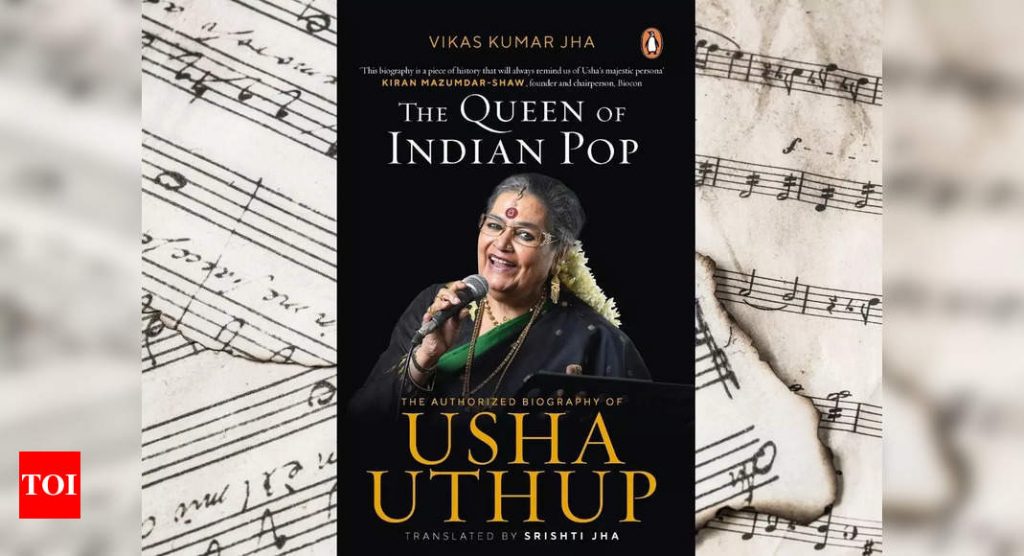[ad_1]
Srishti Jha’s translation of Vikas Kumar Jha’s ‘Ullas ki Naav’ throbs with joie de vivre! It shouldn’t come as a surprise, given that the subject of this superb biography is none other than our own Usha Uthup. The amazing thing, however, is that this translation doesn’t let anything get ‘lost in translation’. On the contrary, Srishti’s language flows with the same ease and vitality characteristic of the inimitable ‘Pop Queen of India’.
While the original Hindi version is a narrative bearing the signature seal of an expert storyteller that veteran journalist Vikas Kumar Jha definitely is, the English translation is replete with an evidence of youth, light-hearted enjoyment, and the airy feeling of simplicity. While the essence of the original has been preserved by Srishti, she elevates it to a new level and delivers a fresh and ingenious narrative that might as well be accepted as a standalone biography.
Every celebrity bears the weight of having to maintain a public persona, that is infallible and charismatic, but imagine doing that throughout a lifetime, that like anyone else’s, is not immune to struggles, hardships, failures, stress, pain, and death! It is written in the preface how Mr. Jha struggled to have an interview with Usha Uthup for decades, and how each time, he found her long-time man Friday, the unrelenting Anjan Das, thwarted his efforts. The story begins from right there. The author doesn’t wait for the readers to begin reading the first chapter, but he deftly sucks in his audience, even before they have finished reading the background story. Srishti also comfortably plies through the contorted alleyways bridging Hindi with English, and she does her job wonderfully!
It is discussed in the same light how in those days when Usha Uthup managed to gain a ‘happy’ foothold in the film industry, filmmakers had a formulaic concept of producing unapologetic tear-jerkers that appealed to womenfolk, who were their target audience. That they had already labeled and compartmentalized women as possessing a special liking for a hot and spicy taste that provoked tears, was a thought that required a powerful antidote. And Usha’s popularity owing to her joyous numbers was just that!
From Usha Vaidyanath Someshwar Sami’s birth to her first marriage to Ramu Iyer, their gradually deteriorating relationship, her unforgettable performance together with Mahalia Jackson in 1968, to her gradual rise on the musical front of 1970s entertainment industry, to her heydays as the ruling queen of Pop and her meeting with her future husband, Jani Chacko Uthup in Trinca’s, her meteoric rise in popularity during the roaring 80s, through her later life replete with the normal course of events like the marriage of her daughter and her son, birth of grandchildren, and the very hard-hitting last chapter– this biography shows how Usha Uthup isn’t a single person. How she is an epitome of resilience in the face of adversity, how celebrity-hood is also subject to the same senses of loss and pain as any other normal human life is, this biography addresses it all.
It is a story of how the pretty dimpled youngster in floral chiffon sarees, with her unconventional voice, gradually transitioned to the kohl-rimmed, heavy-set middle-aged songstress with her fashion staples like the quintessential large ‘bindi’, the pretty jasmine garlands adorning her enviable long braid, the jangle of all her four dozen bangles and the swish of those heavy silk sarees! It is also the story of the sad loss of those long tresses, but most of all, it is about the celebration of music, womanhood, and human life.
All these together with Srishti Jha’s beautiful translation work can only be taken by the world as the true gift of the power of women, family traditions, smiles, kinship, the power of liberalization of thoughts, the courage to challenge conformity and return a bigger and better version of it (after all, who could ever conceive of a 100% Indian woman donning heavy Kanjeevarams singing the Westernised version of ‘Hare Rama Hare Krishna’ to a global audience?), breaking free of mental shackles of grief and of course, re-emerging from it all, scathed but wiser.
Overall, Srishti Jha’s translation of Vikas Kumar Jha’s ‘Ullas ki Naav’ is a true celebration of life, and so, it should definitely make for an interesting read.
READ MORE: Parenting tips on how to make your kid love reading
[ad_2]
Source link

